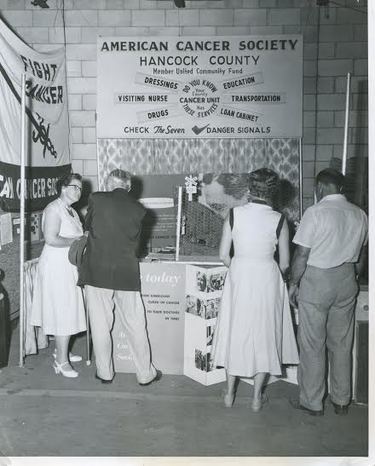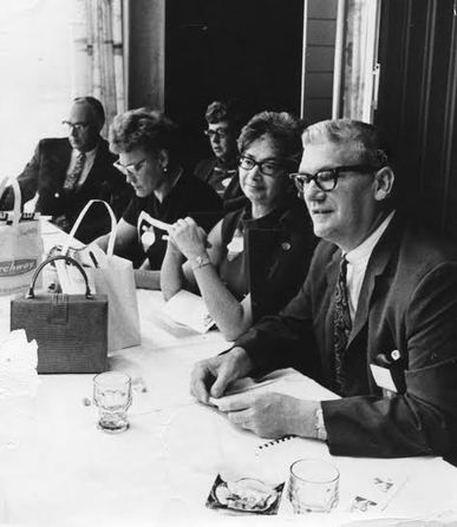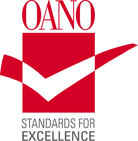|
The agency that is now known as Cancer Patient Services traces its origins back to 1946 and on March 1, 1948 officially became the Hancock County Chapter of the American Cancer Society. Its primary goal was to serve the needs of cancer patients and their families in Hancock County.
During the 1950’s, a nationwide organization called the United Community Fund (later to become known as the United Way) developed a new philosophy of collective fundraising for charitable organizations. The Hancock County Chapter saw this as a wonderful opportunity to increase funding for its programs and services and became affiliated with the local United Community Fund and their annual drive. The American Cancer Society (ACS) did not want its chapters joining the United Community Fund fearing that it would dilute its own fund-raising efforts. As a result, ACS issued an ultimatum to the Hancock County Chapter to cease its affiliation with the United Community Fund or else, no longer be a local chapter of ACS. On May 1, 1959, the Hancock County Cancer Society was formed in anticipation of the local group being cut off from the national charity. The Board of the Hancock County Chapter knew what it wanted and needed to do. Therefore, on July 14, 1959 voted unanimously (20-0) to remain affiliated with the United Community Fund. ACS formally notified the Hancock County Cancer Society on Aug. 26, 1959 that it was pulling its charter from their unit and setting up another chapter in Hancock County. On September 8, 1959, an organizational meeting of the Hancock County Cancer Society, now an independent agency affiliated with the United Community Fund, was held and by April 20 of the next year, the organization received approval for tax exempt status from the Internal Revenue Service. |
The Hancock County Cancer Society continued its service to those in our community afflicted with cancer for many years from an office at 300 West Front Street in Findlay. After ongoing public confusion between HCCS and ACS, the Board unanimously voted on March 17, 1977 to change the name of the organization to Cancer Care Society. The United Way registered the organization with the Ohio Secretary of State’s Office. On January 1, 1988, in response to a threatened suit about the use of its name from a similarly named organization in New York State, Cancer Care Society officially became Cancer Patient Services; which name it bears today.
In the early 1990’s, the organization moved from its long time home on West Front Street to a larger location at 820 North Main Street, Unit 7 in Findlay before relocating in June of 2006 to Suite 120 in the Family Center as one of the original occupants of the facility located at 1800 North Blanchard Street in Findlay. Throughout its long history, regardless of the name it has gone by or the location from which it has operated, the primary focus has always been to improve the lives of Hancock county cancer patients and their families.
In the early 1990’s, the organization moved from its long time home on West Front Street to a larger location at 820 North Main Street, Unit 7 in Findlay before relocating in June of 2006 to Suite 120 in the Family Center as one of the original occupants of the facility located at 1800 North Blanchard Street in Findlay. Throughout its long history, regardless of the name it has gone by or the location from which it has operated, the primary focus has always been to improve the lives of Hancock county cancer patients and their families.
Standards of Excellence OrganizationCancer Patient Services was awarded the OANO Standards of Excellence award in 2012.
Ohio’s nonprofit sector is committed to public service. Hard at work in communities across the state, nonprofit organizations are serving and meeting the needs of our citizens and strengthening our communities. The success of Ohio’s nonprofit organizations depends upon public confidence and broad public support. Ohio’s nonprofits are supported by individuals, corporations, and foundations through charitable contributions and volunteer effort; by government through contracts and grants; by consumers through purchases and fees; and by the general public through state and federal tax laws. The Ohio Association of Nonprofit Organizations (OANO) is committed to bolstering public confidence in and support for the nonprofit sector. Therefore, OANO is adopting these Standards for Excellence (Standards) to promote ethical practices and accountability in nonprofit organizations across the state. |
Nonprofit organizations must comply with applicable local, state, and federal laws. These Standards build on that foundation, and go a step further. Based on fundamental values – such as honesty, integrity, fairness, respect, trust, responsibility and accountability – these Standards describe how nonprofits should act to be ethical and accountable in the program operations, governance, human resources, financial management, and fundraising. Eight (8) Guiding Principles are provided, along with fifty-eight (58) Standards – more detailed performance benchmarks that will enable nonprofits to strengthen their operations.
OANO is committed to these Standards and all OANO members are required to pledge their commitment to the Guiding Principles. Members are supported in their efforts to implement the Standards through training and technical assistance provided by OANO, as well as through a voluntary self-regulatory program by which organizations are evaluated based on their compliance with the performance indicators. In addition, OANO invites non-member nonprofits to subscribe to these Standards.
The Standards for Excellence are intended to describe how the most well managed and responsibly governed organizations should and do operator. They provide benchmarks to determine how well an organization is fulfilling its obligations to those who benefit from its programs, to contributors, and to the public.
OANO is committed to these Standards and all OANO members are required to pledge their commitment to the Guiding Principles. Members are supported in their efforts to implement the Standards through training and technical assistance provided by OANO, as well as through a voluntary self-regulatory program by which organizations are evaluated based on their compliance with the performance indicators. In addition, OANO invites non-member nonprofits to subscribe to these Standards.
The Standards for Excellence are intended to describe how the most well managed and responsibly governed organizations should and do operator. They provide benchmarks to determine how well an organization is fulfilling its obligations to those who benefit from its programs, to contributors, and to the public.






